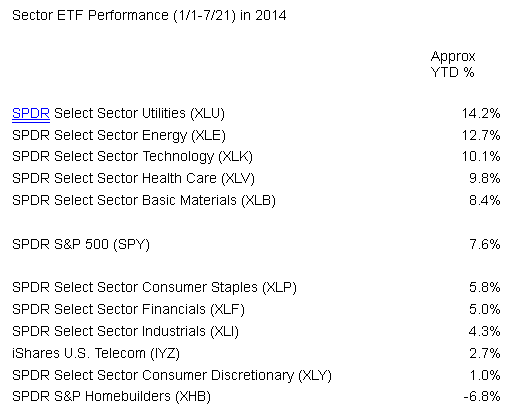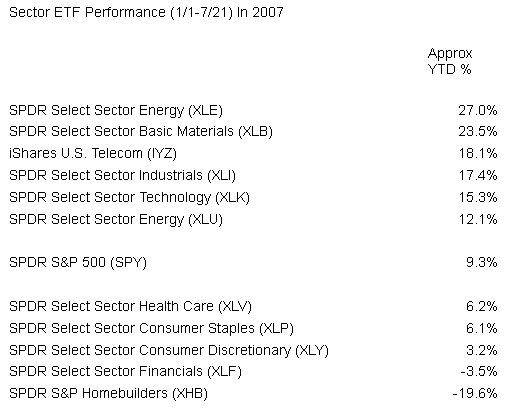The S&P 500 has served up a 7%-plus return through the first six-and-a-half months of the year. That’s remarkably impressive when one considers the depth of geopolitical conflict, the implication of structural under-employment, the October end of quantitative easing (QE3) and the strong possibility of a significant change to the legislative branch this November.
Naturally, some investment sectors of the economy have outperformed others. Here’s a peek at the 2014 year-to-date results:

On the surface, the progress for equities is enviable. The areas that pose the most concern have been areas that I have discussed since January. Housing has witnessed declining sales for the better part of the last 12 months. In a similar vein, inflation-adjusted declines in median family income has damaged the purchasing power of the consumer. Higher food prices have been hitting staples, while part-timers and labor force drop-outs have less ability to acquire nonobligatory goods. What’s more, financial firms remain stingy with respect to lending out reserves, making it difficult to generate profits that have not been goosed by corporate buybacks.
Nevertheless, across-the-board gains have been very respectable. The fact that technology and biotech/pharma-dominant healthcare are pushing the upper echelon of sector investing is a testament to a forward-thinking risk orientation. Demographic shifts in the U.S. and abroad favor healthcare-related assets; technology stocks in today’s world offer a combination of extraordinary growth and satisfactory income that is often difficult to replicate elsewhere. In contrast, utility stocks tend to offer the highest levels of income at the expense of revenue growth. Materials stocks often grow by bounds and leaps when the global economy is rapidly expanding, though income distributions may be less attractive to the dividend enthusiast.
Indeed, my client portfolios have been overweight technology and health care for quite some time. That said, two of my largest client holdings for years used to be Vanguard Information Technology (NYSE:VGT) and PowerShares Pharmaceuticals (NYSE:PJP). Early in 2014, though, I downshifted the risk component by moving into First Trust Technology Dividend (NASDAQ:TDIV) and SPDR Select Healthcare (ARCA:XLV). It is by no means a solution to a bearish sell-off that would clobber equities of all stripes, but lower volatility and better valuations provide a bit more sleep-at-night comfort.
One comparison that is worth making here is the similarity in leadership from seven years ago. Specifically, back in mid-July of 2007, the overall market looked relatively healthy. The S&P 500 was up about 9%. Energy and Materials had some of the best performances, while Financials and Consumer stocks underachieved.
Here is a sector ETF performance table for seven years earlier:

On a relative basis, the consumer, financials and housing areas struggled in July of 2007. The same is true here in July of 2014. Energy and Materials also out-hustled the S&P 500 in July of 2007. Perhaps it is not as pronounced, yet the same scenario exists here in July of 2014.
Are we headed for a credit crunch that rivals the sub-prime sickness near the tail end of the 10/2002-10/2007 bull market? Hardly. On the flip side, turnover in high-yield bonds is 40% less today than it was in 2007 with plenty of corporate issuance and plenty of ETF investors still seeking yield. Market makers would not be able to absorb a panicky wave of sell orders when dealer inventory is a fraction of what it was seven years ago. Liquidity of bonds could be a major source of trouble for equity markets as well. And lest anyone has forgotten the fragility of European banks – the sovereign debt that many have been forced to hold can still become as unstable as sub-prime mortgage backed assets or promises by the Greek government.
There’s one more issue that very few seem to talk about either. Is the U.S. economy accelerating or decelerating? In 2012, our gross domestic product (GDP) annualized at 2.8%. In 2013, economic expansion came in at 1.9%. And even the most optimistic projections for full-year 2014 are at 1.6%. Granted, the market is not the economy and the economy is not the market. Still, this is the same pattern that occurred in 2005 (3.4%), 2006 (2.7%) and 2007 (1.8%). The decelerating economy occurred alongside a tightening of monetary policy and a lengthy period of elevated rates. The slow-to-act Fed did not lower rates fast enough in 2008 to deal with the recession’s impact.
If the pattern holds – if the Federal Reserve does increase rates in 2015 in spite of a decelerating economy – where might that lead risk assets? We may be nowhere near an inverted yield curve, but long-term rates have been coming down sharply and the curve is getting flatter by the day.
Disclosure: Gary Gordon, MS, CFP is the president of Pacific Park Financial, Inc., a Registered Investment Adviser with the SEC. Gary Gordon, Pacific Park Financial, Inc, and/or its clients may hold positions in the ETFs, mutual funds, and/or any investment asset mentioned above. The commentary does not constitute individualized investment advice. The opinions offered herein are not personalized recommendations to buy, sell or hold securities. At times, issuers of exchange-traded products compensate Pacific Park Financial, Inc. or its subsidiaries for advertising at the ETF Expert web site. ETF Expert content is created independently of any advertising relationships.
The S&P 500 has served up a 7%-plus return through the first six-and-a-half months of the year. That’s remarkably impressive when one considers the depth of geopolitical conflict, the implication of structural under-employment, the October end of quantitative easing (QE3) and the strong possibility of a significant change to the legislative branch this November.
Naturally, some investment sectors of the economy have outperformed others. Here’s a peek at the 2014 year-to-date results:
|
Sector ETF Performance (1/1-7/21) in 2014 |
